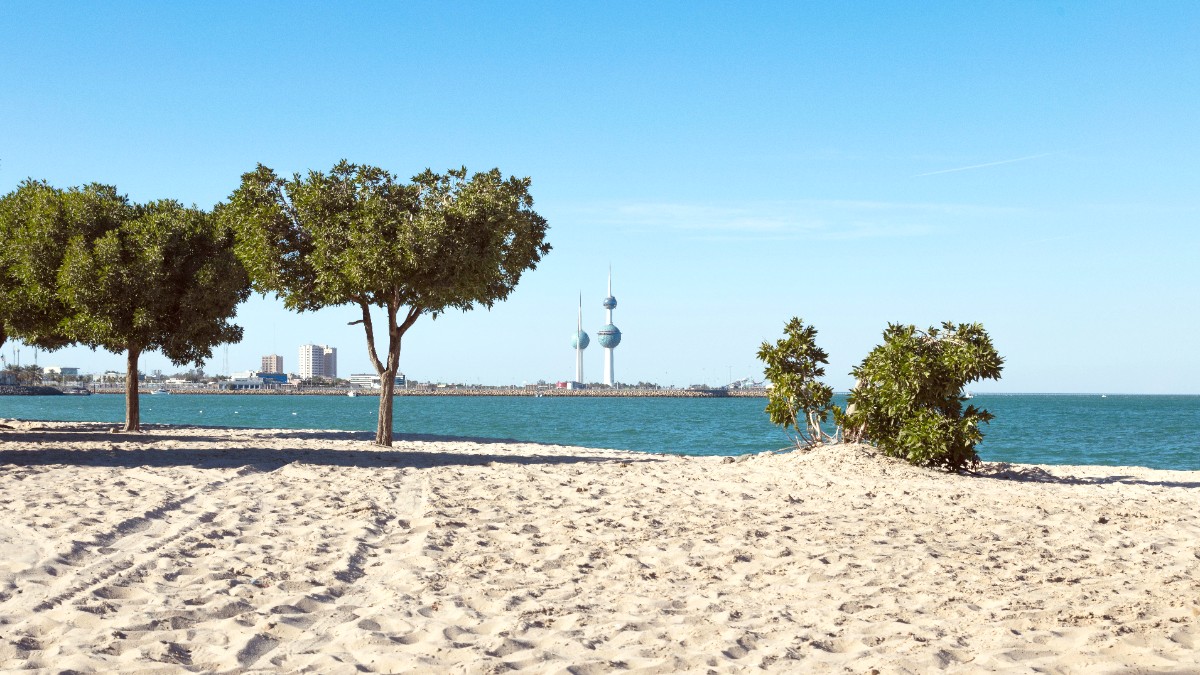
Kuwait
Summer (June - September): Temperatures often go over 40°C (104°F). They can hit 50°C (122°F) or more in July and August. Coastal humidity can be very high, making it feel hotter. Rain is rare.
Winter (December - February): Mild and pleasant. Daytime temperatures go from 15-25°C (59-77°F). Nights are cooler. This period has the most comfortable conditions for outdoor activities.
High Season (December - February): The weather is most comfortable for outdoor activities and sightseeing. This period suits exploring souqs, parks, and historical sites. Walking along the Corniche or taking desert tours work well without intense heat.
Higher demand for flights and accommodations occurs. This may mean higher prices.
May - September
Much lower prices for flights and hotels. Fewer tourists make indoor attractions less crowded.
Extreme heat limits outdoor activities. High humidity can be uncomfortable. Some local businesses may have reduced hours during Ramadan.
October-November, March-April
Pleasant temperatures, fewer crowds than peak winter. Better deals on flights and hotels.
Early autumn and late spring can be warm. Dust storms may occur in spring.
December - February
Most comfortable weather for all activities.
Higher demand for flights and hotels, higher prices. Book well in advance.
Summer months pose heatstroke and dehydration concerns. Always stay hydrated. Seek shade during peak sun hours.
Known as "Tawaz" or "Shamal" winds, these can occur anytime, more common in late spring and early summer. Dust storms lower visibility and air quality. Check local forecasts.
Winter (December-February) and early shoulder seasons (October, March) are ideal.
Museums, malls, and cultural centers suit year-round visits, especially in hot summers.
The city's modern indoor infrastructure ensures comfort even during intense heat.
If outdoor exploration ranks high, winter travel works best.
For indoor cultural sites and shopping, the low season offers value.
Entry rules vary by nationality. Check your specific requirements before travel.
Citizens of certain countries (EU, Australia, Canada, Japan, New Zealand, Norway, South Korea, Switzerland, US, UK, Singapore, Malaysia) may obtain a visa on arrival at Kuwait International Airport (KWI) for a fee. This typically grants a single-entry visa for up to 3 months.
Your passport needs validity for at least six months beyond your planned departure. This matches a common international travel rule.
If your flight experiences delays or cancellations, you may have rights to compensation. AirHelp assists passengers with claims.
Kuwait is a costly destination, specifically when compared to some other Middle Eastern countries.
The official currency is the Kuwaiti Dinar (KWD). It holds one of the highest values globally, meaning your home currency may not go as far.
ATMs are available throughout Kuwait City for cash withdrawals. Major banks and exchange offices are also present. Credit cards (Visa, Mastercard) enjoy wide acceptance in hotels, larger restaurants, and shops. Carry some cash for smaller purchases, local souqs, or traditional taxis.
Daily Costs: 60-90 KWD (~200-300 USD). Focus on budget hotels, local eateries, and public transport.
Visit free attractions like the Corniche or Al Shaheed Park.
This budget needs conscious effort to save.
Daily Costs: 100-150 KWD (~330-500 USD). Stay in 3-4 star hotels, dine at mid-range restaurants, and use taxis.
This travel style offers comfort without extravagance.
Daily Costs: 200+ KWD (~660+ USD). Stay in 5-star hotels, fine dining, private car services, and exclusive tours.
This budget allows for indulgence and convenience.
Premium experiences come with higher costs.
| Category | Type | Cost (KWD) |
|---|---|---|
| Accommodation (per night) | Budget | 20-40 |
| Accommodation (per night) | Mid-range | 40-80 |
| Accommodation (per night) | Luxury | 80-250+ |
| Meals (per person) | Street Food | 2-5 |
| Meals (per person) | Mid-range | 7-15 |
| Meals (per person) | Fine Dining | 20-50+ |
| Transportation | Bus fare | 0.250-0.300 |
| Transportation | Taxi (short) | 2-5 |
| Transportation | Airport Taxi | 6-10 |
| Attractions | Grand Mosque | Free |
| Attractions | Cultural Centre | 1-5 |
Kuwait City maintains a reputation as a very safe destination with modern healthcare facilities.
No mandatory vaccinations. Routine ones are updated. Typhoid and Hepatitis A are recommended for travelers.
Bottled water widely available and preferred. Food hygiene generally good in established places.
Modern hospitals and clinics available. Private hospitals offer high care standards for international visitors.
Heatstroke and Dehydration are main concerns, especially in summer.
Stay hydrated by drinking plenty of water. Wear lightweight, light-colored clothing. Seek shade. Limit outdoor activities during peak sun hours (typically 11 AM - 4 PM).
Dust storms: may cause respiratory irritation. If sensitive, consider a mask during dust storms.
Food and Waterborne Illnesses: Drink bottled water. Choose food establishments with high turnover and visible hygiene. Wash hands frequently.
Kuwait has a very low crime rate. Kuwait City is safe for travelers. Petty crime is rare, but can occur in crowded areas like souqs.
Specific neighborhoods do not pose significant safety concerns for tourists. Exercise general caution.
Dust storms can occur. Extreme heat is the main hazard, especially during summer. Heed warnings and take precautions.
Save these contacts before your trip for quick access.
Tap water is generally safe for drinking in Kuwait City, but most locals and visitors opt for bottled water due to taste and mineral content. Bottled water is widely available. Food hygiene standards are generally good in established restaurants and hotels.
Bottled water is preferred for taste.
Good food hygiene at established places.
Use judgment when choosing street food eateries.